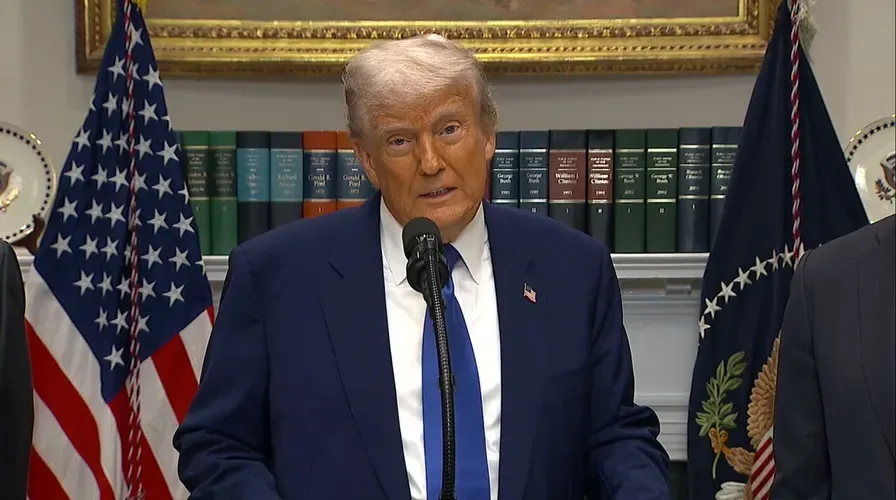Trump Embraces Traditionally Democratic Policies in Bid to Build 'Party of Common Sense'
President Donald Trump’s policies on drug prices and taxes showcase a unique bipartisan approach blending Republican and Democratic ideas.

President Donald Trump is actively promoting a series of initiatives he argues will create a "golden age" for America, drawing on what he calls commonsense approaches. Notably, some of these moves borrow from long-standing Democratic policy proposals, underscoring a shifting landscape in partisan politics.
"In everything we do, we're putting America first, because the Republican Party is now known as the party of common sense," Trump told a gathering of Republican governors earlier this year. He emphasized that while the GOP remains conservative, its core focus should be on pragmatic solutions.
Despite continued criticism from liberal commentators—many labeling Trump a "threat to democracy" and invoking comparisons to historical autocrats—the president has enacted or voiced support for policies once championed by Democrats. Among the most notable is his recently signed executive order targeting high prescription drug prices.
Major Policy Moves
- Trump’s executive order aims to lower drug prices by "50 to 80 to 90%" by tying U.S. costs to prices paid in other developed countries.
- He declared that the U.S. would no longer subsidize the healthcare of foreign countries, stating that Americans have unfairly shouldered higher costs for years.
The order has sparked debate among policy experts, with some warning that such price controls could lead to pharmaceutical shortages. "We see price caps after natural disasters," one analyst warned, adding, "So that's what we can expect price controls to produce when it comes to pharmaceuticals as well."
Efforts to reduce prescription drug costs have been central to Democratic platforms, with figures like Sen. Bernie Sanders and Vice President Kamala Harris previously leading similar pushes. Yet, with Trump taking direct action, some former Democratic allies expressed cautious approval. Sanders, while supporting the principle, argued that the courts might block the order unless Congress passes new legislation.
"This is an extraordinary day," said Robert F. Kennedy Jr., Trump’s Health and Human Services Secretary, noting that for decades Democratic leaders had pledged similar reforms but failed to deliver. "As it turns out, none of them were doing it... because they know Congress is controlled in so many ways by the pharmaceutical industry,” Kennedy remarked.
Shifting Economic Policies In addition to health care reforms, the Trump administration has released details on upcoming tax legislation, including a proposed expansion of the child tax credit—a policy frequently highlighted by Democrats. House Republicans outlined plans to increase the child tax credit from $2,000 to $2,500 per child, while some lawmakers have advocated for even higher amounts.
Top Democrats, such as Kamala Harris and Hakeem Jeffries, have campaigned on expanding such credits, sometimes proposing as much as $6,000 for parents of newborns. During her campaign, Harris described the early months of a child's life as "a vital, vital year of critical development," emphasizing the financial burden on young families.
Trump has further stirred debate by expressing openness to raising taxes on wealthier Americans, traditionally a Democratic agenda item. "People would love to do it. Rich people. I would love to do it, frankly. Giving us something up top in order to make people in the middle income and the lower income brackets more. So, it's really a redistribution," Trump stated last week.
While acknowledging potential political fallout—drawing a parallel to George H.W. Bush's infamous tax reversal—Trump signaled he would support such a move if Republicans approved it. "I’m OK if they do!!!" he wrote on social media.
Calls for taxing the wealthy have been rallying cries for Democrats for years, exemplified by slogans like "tax the rich." Figures such as Sanders, Alexandria Ocasio-Cortez, and Elizabeth Warren have pushed for ensuring corporations and high earners "pay their fair share."
A Party Realignment? Trump’s embrace of certain Democratic-style policies comes amid a wave of former Democrats joining his ranks. Health Secretary Robert F. Kennedy Jr., former Democratic Rep. Tulsi Gabbard, and tech billionaire Elon Musk—who endorsed Trump and later joined his administration—are among those who have shifted allegiances.
Supporters argue that Trump has successfully recast the GOP as the "party of the working class" and common sense, delivering action where Democrats offered only rhetoric. "While Democrats spent decades talking about helping everyday Americans, President Trump is actually delivering – revealing Democrats’ incompetence and corruption in the process," said White House spokesman Kush Desai.
As the administration continues to promote this blend of policy ideas, the boundaries between traditional party platforms are becoming increasingly blurred, setting the stage for a new era in American political debate.
